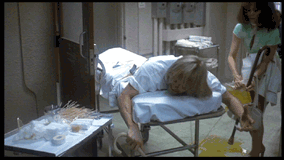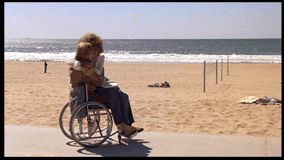|
Newest Reviews:
New Movies -
The Tunnel
V/H/S
The Tall Man
Mama Africa
Detention
Brake
Ted
Tomboy
Brownian Movement
Last Ride
[Rec]³: Genesis
Hara-Kiri: Death of a Samurai
Indie Game: The Movie
Abraham Lincoln: Vampire Hunter
Old Movies -
Touki Bouki: The Journey of the Hyena
Drums Along the Mohawk
The Chase
The Heiress
Show
People
The Strange Affair of Uncle Harry
Pitfall
Driftwood
Miracle Mile
The Great Flamarion
Dark Habits
Archives -
Recap: 2000,
2001, 2002,
2003, 2004
, 2005, 2006,
2007 , 2008
, 2009 ,
2010 , 2011 ,
2012
All reviews alphabetically
All reviews by star rating
All reviews by release year
Masterpieces
Screening Log
Links
FAQ
E-mail me
HOME
| |
Coming Home (Hal Ashby) 1978
 Clearly, Hal Ashby’s Coming Home was
meant to be an “Important Film”. As one of the first major motion pictures
to critically examine the home-front’s reaction to Vietnam, it was surely more
polarizing in 1978 that it is these days, especially due to the presence of
actress / activist Jane Fonda. The film’s anti-war politics are adamantly made
clear, to the detriment of the rest of the work.
Nearly all of the film’s problems lie in the oversimplifications found
in its script that exist so it’s impossible to come to any favorable opinion
of American involvement in Vietnam. The way that after seeing her husband off to
‘Nam, a woman immediately changes from a skirt to pants or the way Fonda’s
character demonstrates her initial patriotism by refusing to turn off a
television broadcast of the “Star-Spangled Banner” are moments of obvious
shorthand that belie the overall intelligence of the film. It’s hard not to
sympathize with the plight of the disabled veterans that we see, so to railroad
us toward a singular opinion of them feels cheap and unnecessary. The refreshing
vérité styling of several of the scenes where we see the veterans in a group
only underlines the manipulations found elsewhere.
Clearly, Hal Ashby’s Coming Home was
meant to be an “Important Film”. As one of the first major motion pictures
to critically examine the home-front’s reaction to Vietnam, it was surely more
polarizing in 1978 that it is these days, especially due to the presence of
actress / activist Jane Fonda. The film’s anti-war politics are adamantly made
clear, to the detriment of the rest of the work.
Nearly all of the film’s problems lie in the oversimplifications found
in its script that exist so it’s impossible to come to any favorable opinion
of American involvement in Vietnam. The way that after seeing her husband off to
‘Nam, a woman immediately changes from a skirt to pants or the way Fonda’s
character demonstrates her initial patriotism by refusing to turn off a
television broadcast of the “Star-Spangled Banner” are moments of obvious
shorthand that belie the overall intelligence of the film. It’s hard not to
sympathize with the plight of the disabled veterans that we see, so to railroad
us toward a singular opinion of them feels cheap and unnecessary. The refreshing
vérité styling of several of the scenes where we see the veterans in a group
only underlines the manipulations found elsewhere.
 Politics aside, there’s little to complain about in Coming
Home. Ashby’s direction is incisive and rarely allows overstatement, and
the film evokes its period with an uncanny accuracy. The editing is especially
noteworthy here, and the non-intrusive integration of its pop soundtrack should
serve as an example to filmmakers today that often let their music dictate the
mood of the scene instead of using it as accentuation. Haskell Wexler’s earthy
cinematography pushes the film’s mood from the didactic and glitzy toward the
realistic. The first scene where we see Fonda doesn’t present her as anything
other than a face in a crowded restaurant, though the notable lack of glamour
lighting throughout makes the mood lighting of a sex scene feel aberrant. Fonda,
and especially Jon Voight, give excellent performances and even if their
characters change a bit too conveniently and quickly to be totally believable,
they lend the melodrama enough power that it never feels cloying. Bruce Dern
paints his Marine Captain with strokes that are, perhaps, a bit too broad,
though that may be more the problem of a script that hates his character’s
point of view than any deficiency of the actor. The forgivable thing about the
motivational messiness in Coming Home
is that it seems to reflect the nation’s confused and conflicting attitudes
toward the Vietnam War. The film ends almost without a resolution and that
unsettled feeling seems appropriate. Thankfully, its makers were clear-sighted
enough not to confuse their self-imposed sense of importance with the illusion
that they had definitive answers.
Politics aside, there’s little to complain about in Coming
Home. Ashby’s direction is incisive and rarely allows overstatement, and
the film evokes its period with an uncanny accuracy. The editing is especially
noteworthy here, and the non-intrusive integration of its pop soundtrack should
serve as an example to filmmakers today that often let their music dictate the
mood of the scene instead of using it as accentuation. Haskell Wexler’s earthy
cinematography pushes the film’s mood from the didactic and glitzy toward the
realistic. The first scene where we see Fonda doesn’t present her as anything
other than a face in a crowded restaurant, though the notable lack of glamour
lighting throughout makes the mood lighting of a sex scene feel aberrant. Fonda,
and especially Jon Voight, give excellent performances and even if their
characters change a bit too conveniently and quickly to be totally believable,
they lend the melodrama enough power that it never feels cloying. Bruce Dern
paints his Marine Captain with strokes that are, perhaps, a bit too broad,
though that may be more the problem of a script that hates his character’s
point of view than any deficiency of the actor. The forgivable thing about the
motivational messiness in Coming Home
is that it seems to reflect the nation’s confused and conflicting attitudes
toward the Vietnam War. The film ends almost without a resolution and that
unsettled feeling seems appropriate. Thankfully, its makers were clear-sighted
enough not to confuse their self-imposed sense of importance with the illusion
that they had definitive answers.
* * * 1/2
4-18-02
Jeremy Heilman
|